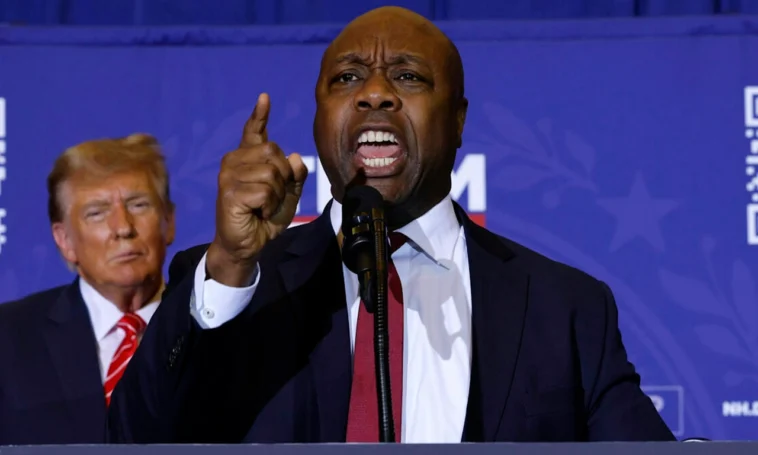Tim Scott Draws Parallels Between Current College Campus Protests and 1960s Activism. Sen. Tim Scott (R-SC) has drawn parallels between the current anti-Israel protests on college campuses and the demonstrations against the Vietnam War in the 1960s. In a Sunday interview on NBC News’ “Meet The Press” with Kristen Welker, Scott expressed his support for peaceful protest but condemned the violent and destructive behavior that has resulted in over 2,000 arrests and detainments on college campuses.
Scott emphasized that the anti-Semitism being witnessed on college campuses today is comparable to what was seen in the 1960s and urged Americans to unite in condemning it. He criticized President Biden for taking too long to publicly condemn anti-Semitism, suggesting that the president’s base has prevented him from doing so.
Scott also addressed college presidents and universities, reminding them that federal funding is a privilege, not a right. He emphasized that every Jewish student has the right to walk to class safely and study in a library peacefully, and that it is essential to ensure every student feels secure on every campus in America.
“What we have to understand is the anti-Semitism that we’re seeing on college campuses today is akin to what we saw in the 1960s,” he continued.
Scott’s comments highlight the growing concern about anti-Semitism on college campuses and the need for peaceful and respectful dialogue. His comparison to the 1960s protests serves as a reminder of the importance of learning from history and promoting inclusivity and understanding. By emphasizing the need for security and safety for all students, Scott’s message resonates with many who value diversity and equality on college campuses.
The rise of anti-Semitism on college campuses is a pressing issue that requires immediate attention and action. The recent protests against Israel have often devolved into violent and hateful rhetoric, creating a hostile environment for Jewish students. The situation is eerily reminiscent of the 1960s, when college campuses were hotbeds of activism and protest against the Vietnam War.
Just as the 1960s protests were marked by a sense of urgency and moral clarity, the current protests against Israel are driven by a similar sense of passion and conviction. However, the line between peaceful protest and violent extremism has often been blurred, leading to a toxic environment that is hostile to Jewish students and faculty.
Scott’s call for unity in condemning anti-Semitism is a crucial step towards addressing this issue. By acknowledging the historical parallels between the current protests and the 1960s, we can learn valuable lessons about the importance of respectful dialogue and inclusivity. Moreover, by emphasizing the need for security and safety for all students, we can work towards creating a campus environment that is welcoming and inclusive for everyone.
The federal government has a critical role to play in addressing the rise of anti-Semitism on college campuses. By conditioning federal funding on a commitment to safety and inclusivity, the government can incentivize colleges and universities to take concrete steps to address the problem. This can include providing resources and support for Jewish students, faculty, and staff, as well as promoting education and awareness about anti-Semitism and its harmful effects.
Furthermore, college presidents and administrators must take a proactive approach to addressing anti-Semitism on their campuses. This includes condemning hateful rhetoric and behavior, providing resources and support for Jewish students, and promoting a culture of inclusivity and respect. By working together, we can create a campus environment that is welcoming and inclusive for everyone, regardless of their background or beliefs.




Boss, I’m still waiting for my payment. December, January and February.
I left because of irregular payment of 3 months without any. I’m a freelancer, not a slave. We agreed on the last week of every month but for 3 months no payment.
I know you are getting money on ads and other stuff. It’s a heart of wickedness not to pay for 90 days.
Please pay my due.